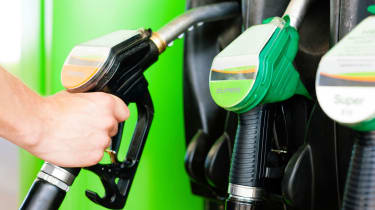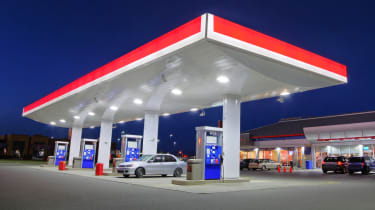UK petrol and diesel prices: latest fuel costs explained
Petrol prices have begun to rise once again after a steep decline. We explain all you need to know and how a new app could soon save you money
Fuel prices are significantly lower than that of a year ago as we approach 2025, but the cost of filling up your car with petrol or diesel is slowly beginning to creep up once more.
In September, the price per litre for petrol fell to its lowest point since March 2022, saving drivers around £9 per tank compared to the previous year.
That ensured fuel prices at Christmas will be at their lowest holiday season level since the pandemic. However, the pockets of motorists are being picked at the pumps once more, as prices have risen by a couple of pence per litre since September.
This is where our handy guide comes in; not only have we got the very latest fuel price figures, courtesy of the RAC, but we’ve also got the answers to some of your most burning questions, too.
Live UK average fuel prices
What is influencing the price of petrol and diesel at the pumps?
There is a lot of conflicting news and information circling the media at the moment when it comes to the cost of living, which may leave you wondering why fuel prices are going up again. Wind back a few years to just after the rock-bottom fuel prices during the COVID-19 pandemic and the original spike came after Russia’s invasion of Ukraine in 2022. Sanctions placed on the Kremlin, as well as the fact that Ukraine is typically deemed as a ‘transit’ country for exporting oil and gas, meant that at the start of the war, the price of oil rose to a peak of well over $100 per barrel.
Yet, while the war in Ukraine has now been raging for almost three years, a lot has happened since then, causing fluctuations in the prices of petrol and diesel. Perhaps the most recent example is the tensions within the Middle East. The war in Gaza, as well as Israel’s fractious relationship with Iran has caused some spikes, although prices currently remain generally steady at anything between $70-$80 per barrel of oil.
Things aren’t helped by the sky-high profit margins of petrol and diesel retailers in the UK, either. An investigation by the Competition and Markets Authority (CMA) recently found that supermarket fuel prices margins doubled in the period between 2017 and 2023. This figure has since softened somewhat – possibly in response to the CMA’s findings – and the new Labour Government has recently doubled down on the previous Conservative administrations’s 5p cut in fuel duty in order to ease the financial burden on motorists. However, retailer margins (especially for petrol) have crept up into double figures once again, pushing up prices.
PumpWatch, Fuel Finder and live fuel price comparison data coming soon
Following pressure from the CMA, as well as significant organisations within the automotive industry, the Government’s Department for Energy Security and Net Zero is currently in the process of implementing a scheme that will force fuel stations to share up-to-the-minute price data online, PumpWatch.
As the law currently stands, filling stations only need to advertise prices on their forecourts, which means drivers must drive between stations to compare prices. However, the CMA’s recommendation of ‘compulsory open data requirements’ would instead force fuel retailers to provide current prices to drivers in an instantly available format that can be used by satnavs or third party mobile phone apps.
Speaking of which, the Government is currently working on a mobile app of its own, called Fuel Finder, which would use Pump Watch data. The result of a collaboration between the Government and tech companies, as well as the likes of the RAC and AA, Fuel Finder will feature data that’s refreshed every 30 minutes, allowing drivers to find the cheapest fuel in their current vicinity.

There is no set date for when Fuel Finder will become available to the public, but it was announced by the CMA in the Autumn 2024 Budget that it would be “by the end of 2025”.
Why is supermarket fuel cheaper than an independent forecourt?
In the past, supermarket forecourts have tended to offer the cheapest fuel prices and this was because of the market power supermarkets hold. Companies like Asda, Tesco, Sainsbury’s and Morrisons are all in competition with one another, so they have kept fuel prices as low as possible hoping that when motorists come to fill their tank, they might do their weekly grocery shopping, too.
In more recent times, however, fluctuating fuel prices have caused some analysts to question whether supermarket fuel really is cheaper. In September 2022, RAC fuel spokesman Simon Williams explained that, “there are lots of smaller forecourts which are now selling fuel much cheaper than the supermarkets. We would urge everyone to shop around for the best deals rather than simply assuming the supermarkets are the lowest because they have been in the past.”
There are persistent rumours that supermarket fuel contains fewer additives and is of lesser quality than fuel from traditional forecourts, but there’s little hard evidence of this. All fuel sold in the UK has to abide by the standards set in the Motor Fuel Regulation.
Why is fuel so expensive on motorways?
Motorway fuel stations argue the reason their prices are higher is that many of them are open 24 hours a day and offer more services than a regular forecourt. Motorway fuel stations also pay high rent prices for the buildings they operate, while there is an argument that motorway drivers are something of a captive audience.

In more remote areas, fuel is often more expensive because of the higher transport and supply costs, but according to RAC fuel spokesman Simon Williams, this doesn’t apply to motorway stations: “We can see no reason why motorway fuel should be so much more expensive. In fact, arguably it is much easier from a delivery point of view than getting fuel to urban filling stations.”
What makes up the price of UK fuel?
The price of fuel can be divided into three sections; the taxes imposed by the Government, the costs of drilling, refining and transporting, and the profit margins for the fuel companies.
For petrol, diesel and bioethanols, the Government gets around 65 per cent of the overall cost through fuel duty and value added tax (VAT). The fuel duty represents the fixed price of fuel – it stays the same regardless how much overall oil prices fluctuate. Currently, the Treasury adds 52.95 pence to each litre of fuel through fuel duty – inclusive of the temporary 5p cut – and another 20 per cent through VAT. How much you pay in VAT depends on how much fuel you purchase.
The second biggest chunk comes from the wholesale costs of the fuel itself. The wholesale cost is a combination of currency exchange rates, global oil prices, and even domestic supply and demand.
Why is supermarket fuel cheaper than an independent forecourt?
In the past, supermarket forecourts have tended to offer the cheapest fuel prices and this was because of the market power supermarkets hold. Companies like Asda, Tesco, Sainsbury’s and Morrisons are all in competition with one another, so they have kept fuel prices as low as possible hoping that when motorists come to fill their tank, they might do their weekly grocery shopping, too.
In more recent times, however, fluctuating fuel prices have caused some analysts to question whether supermarket fuel really is cheaper. In September 2022, RAC fuel spokesman Simon Williams explained that, “there are lots of smaller forecourts which are now selling fuel much cheaper than the supermarkets. We would urge everyone to shop around for the best deals rather than simply assuming the supermarkets are the lowest because they have been in the past.” The Competitions and Markets Authority are looking at supermarket fuel pricing in a bid to “get to the heart of the issues” around apparently high fuel prices.
There are persistent rumours that supermarket fuel contains fewer additives and is of lesser quality than fuel from traditional forecourts, but there’s little hard evidence of this. All fuel sold in the UK has to abide by the standards set in the Motor Fuel Regulation.
Why is diesel more expensive than petrol?
Although diesel and petrol are taxed the same by the Treasury, historically diesel has been more expensive than petrol, as domestic refineries have struggled to meet demand. This has forced the UK to import diesel from other countries at a greater rate than petrol. In addition, diesel prices are pushed up by the cost of the additives that go into the fuel.
Furthermore, the gap between UK petrol and diesel prices widens during the winter. The end of the US “driving season” means retailers have a surplus of petrol they can’t export, so they sell it here at a lower price. Diesel demand, meanwhile, increases across continental Europe, where the fuel is commonly used in heating oil.
Recently, the influx of cheap diesel from countries like Saudi Arabia has turned the tide, swinging diesel wholesale prices closer to that of petrol, and bringing the pump price down with it. However the fact that we get a higher percentage of diesel from Russia than petrol means the advantage has swung the other way again.
What's your view on fuel prices in the UK? Do we pay too much for our petrol and diesel? What would you do about it? Join the debate in our comments section below...






